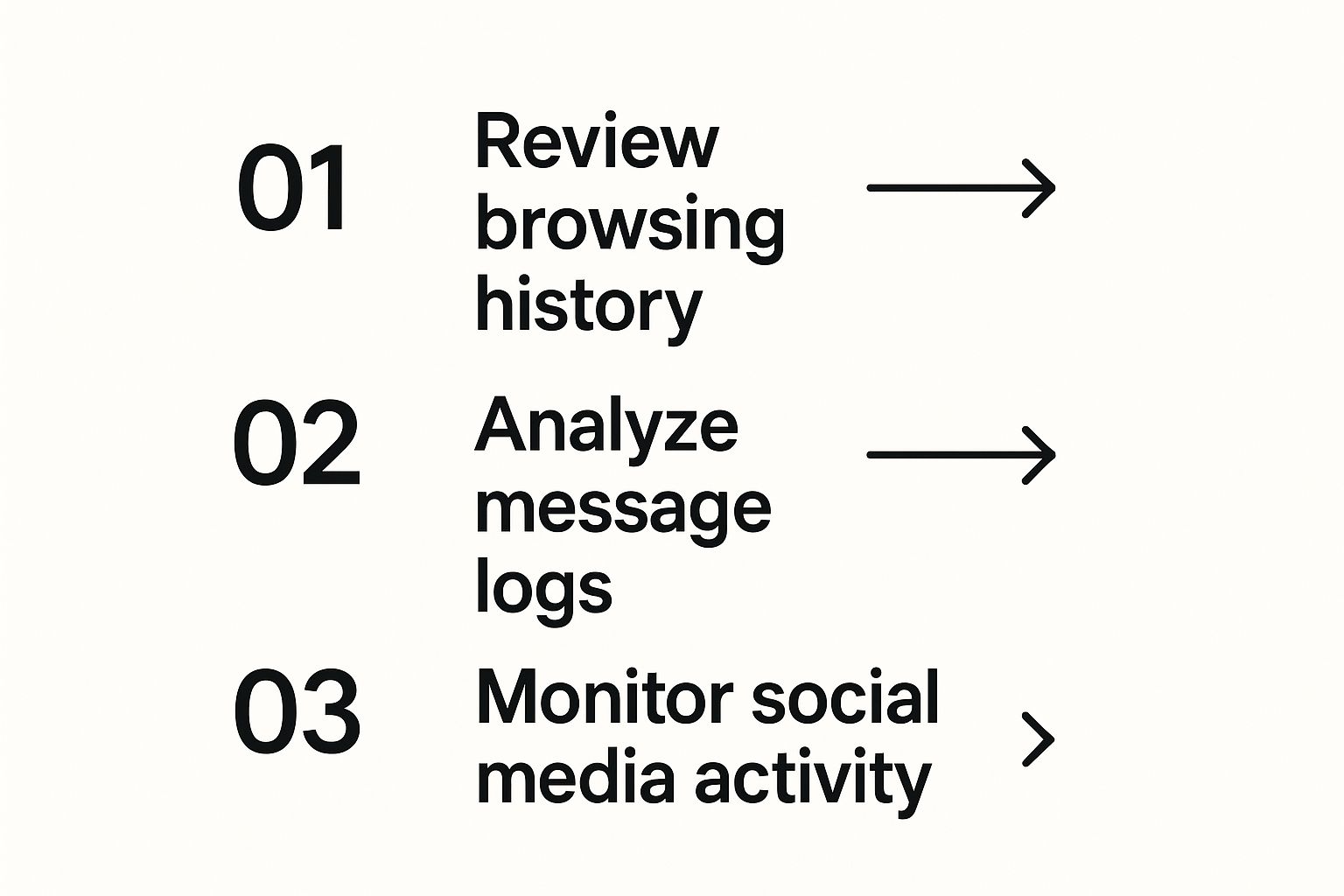It often starts with a gut feeling, doesn’t it? That nagging sense that something is off. But to truly understand how to catch a cheating partner, you need to move beyond intuition and start observing. The real giveaway isn’t a single, isolated incident. It’s the cluster of consistent, overlapping changes in behaviour—like a sudden obsession with phone privacy that happens at the same time as a new, unexplained routine.
Recognising the Real Signs of Infidelity

When the rhythm of your relationship changes, it’s easy to let your mind race. But before you act, it’s crucial to understand the subtle, yet significant, behavioural shifts that often go hand-in-hand with infidelity. These signs are rarely as dramatic as a scene from a film; more often, they’re small, persistent cracks in your established patterns.
One of the first things people notice is a sudden shift in their partner’s relationship with technology. A phone that used to lie casually on the coffee table is now guarded like Fort Knox. You might see them tilting the screen away from you, slamming a laptop shut when you walk in, or taking calls in another room.
This digital secrecy often coincides with growing emotional distance. The deep conversations you once had become shallow and frustrating. Ask about their day, and you might get vague, one-word answers or stories that feel rehearsed and oddly lacking in detail.
Differentiating Between Stress and Suspicion
Life gets busy, and it’s easy to mistake normal stress for something more sinister. A bad week at work can make anyone withdrawn. The key is to distinguish between temporary behavioural shifts and persistent, worrying indicators.
To help you tell the difference, I’ve put together a table based on patterns I’ve seen time and time again.
Common Behavioural Shifts Versus Potential Infidelity Indicators
| Common Behavioural Shift | Potential Infidelity Indicator (Red Flag) | What It Could Mean |
|---|---|---|
| Works late a couple of times due to a big project. | “Late nights at the office” become a weekly, unexplained event. | The excuse provides a consistent block of unaccounted-for time. |
| Starts a new fitness regime to get healthier. | Joins a gym but can’t describe the workouts or seems to spend hours there. | The ‘new hobby’ is a convenient cover story for their absence. |
| Is quiet and withdrawn after a stressful day. | Becomes emotionally distant for weeks, avoiding deep conversation. | They are emotionally investing in someone else, leaving little for you. |
| Buys a new outfit for a special occasion. | Suddenly overhauls their entire wardrobe and grooming habits. | The increased focus on appearance is to impress a new person. |
| Seems less interested in sex due to fatigue. | Avoids all forms of intimacy, both physical and emotional. | Intimacy with you might feel like a betrayal of their new connection. |
This table isn’t definitive proof, but it’s a practical way to assess if what you’re seeing is a pattern of deception or just the normal ups and downs of life.
The Emotional Connection Factor
It’s a common mistake to think all affairs are purely physical. Emotional attachment is a massive part of infidelity. In fact, UK data suggests that around 44% of affairs involve a significant emotional connection, which means the signs often show up in communication and shifting priorities long before anything physical happens.
Even if an affair is discovered and supposedly over, this emotional link can linger. It’s vital to watch for subtle signs your partner might still be emotionally connected to an affair, as these can prevent any real healing from taking place.
Your intuition is a powerful tool. Let it guide you to start observing, but don’t let it be your only piece of evidence. A cluster of these changes happening together is far more telling than any single action on its own.
Recognising these behaviours is your first step. For a more granular breakdown, you can explore these tell-tale signs that your partner may be up to something to get more specific guidance.
Gathering Digital Clues Legally and Ethically
When you start suspecting your partner is cheating, the pull to find digital proof can feel irresistible. But before you dive in, it’s absolutely vital to know where the legal and ethical lines are drawn. Crossing them can land you in serious legal trouble here in the UK, so the smart approach is to stick to information that’s either public or already shared between you.
The safest place to start your search is with the devices and accounts you both use. We’re talking about the family iPad that sits on the coffee table, a shared laptop for household admin, or even a joint Netflix account with its own viewing history. You are generally well within your rights to look at information on a device you co-own and regularly use.
This method allows you to look for inconsistencies without illegally breaching your partner’s privacy. For example, a quick look through the browser history on a shared computer might throw up searches for dating sites or hotels. You might also check the location history on a shared tablet’s map app, which could reveal trips to places you can’t account for.
Navigating Shared Digital Spaces
Trying to figure out how to catch a cheating partner in the digital age opens up a lot of avenues, but you have to walk them carefully. The golden rule is to focus on areas where you already have legitimate access.
Here are a few places you can often check without breaking the law:
- Shared Phone Bills: A detailed mobile phone bill can be a goldmine of information, especially if it’s a family plan in your name. Keep an eye out for a sudden spike in calls or texts to one specific, unfamiliar number.
- Social Media Activity: Pay attention to what’s happening on their public profiles. Are they suddenly getting very friendly comments from someone new? Have they started untagging themselves from photos of you together? These subtle shifts can speak volumes.
- Vehicle GPS History: If you share a car, the built-in sat-nav usually keeps a log of recent or frequent destinations. An address that makes no sense for work or social plans could be a major red flag.
The general idea is to start with the least invasive checks and work your way from there, always making sure you stay on the right side of the law.

Starting with things like browser history on a shared device is far less problematic than trying to access private message logs.
Understanding Legal Boundaries in the UK
It’s just as important to be crystal clear on what you legally cannot do. Things like installing spyware on your partner’s personal phone, guessing their password to get into their private email account, or putting a tracker on their car without consent aren’t just unethical—they can be criminal offences.
Under the Computer Misuse Act 1990, accessing someone’s private digital accounts without their permission is illegal. Any “evidence” you find this way will be thrown out of court and could even lead to you being prosecuted.
This distinction is everything. Looking at the search history on the family computer is one thing; hacking into a private social media account is something else entirely. If a particular action feels like a major violation of privacy, trust that instinct.
Your goal is to find clarity, not to commit a crime that will only make a difficult situation a thousand times worse. If you genuinely believe you need evidence that can only be obtained through surveillance, that’s your cue to stop and bring in a professional.
Having the Talk and Reading the Signs

Let’s be honest: bringing up your suspicions of cheating is one of the most dreaded conversations you can ever have. The secret isn’t to go in all guns blazing, but to frame it as a conversation about your own feelings and what you’ve been noticing. A direct but careful approach can get you to the truth much faster than weeks of silent worrying.
The aim here is to open the door for honesty, not to force a confession or trigger a defensive shouting match. First, pick your moment. It needs to be a calm, private time where you won’t be interrupted or rushed. Absolutely avoid starting this conversation late at night or in the middle of an unrelated argument when emotions are already on a knife-edge.
Instead of an outright accusation like, “I know you’re cheating,” try coming at it from your own perspective. Something like, “I’ve been feeling a bit disconnected from you lately, and I’ve noticed things feel different between us. Can we talk about it?” This simple shift feels less like an attack and more like an invitation to talk, which is exactly what you need.
How to Open the Dialogue
The first few words you say will set the tone for everything that comes next. Remember, you’re not trying to win an argument; you’re looking for clarity. Using “I” statements is a brilliant way to communicate your hurt and confusion without immediately putting them on the back foot.
Here are a few gentle but clear ways to get started:
- Point to a specific behaviour: “I’ve noticed you’ve been working late far more often, and you seem really distant when you get home. It’s making me feel worried about us.”
- Share how you’re feeling: “I have to be honest, I’ve been feeling quite insecure in our relationship lately and I could really do with some reassurance.”
- Ask for honesty: “I feel like there’s something going on that I’m not aware of, and it’s really important for me that we’re open with each other.”
Their immediate response to one of these openers is often very telling. A partner who is committed and has nothing to hide will likely show concern for your feelings, even if they’re a bit baffled. On the other hand, a defensive or dismissive reaction is a pretty big red flag.
Understanding Their Reaction
Once you’ve started the conversation, their response—what they say and what their body language tells you—is your next piece of the puzzle. It’s incredibly difficult to maintain a lie under direct, heartfelt questioning, and you can often spot the cracks if you pay attention.
In the UK, infidelity is more common than many of us would like to think. Shockingly, around 20% of adults admit to having cheated on a partner, which shows just how vital it is to recognise these reactions. You can explore more infidelity statistics and discover more insights about UK trends on liedetector.co.uk.
Pay very close attention to how they answer your concerns. Are they immediately turning the blame onto you? Accusing you of being paranoid, jealous, or insecure? This is a classic gaslighting tactic designed to make you question your own instincts.
A partner with nothing to hide will usually try to understand where your fears are coming from. They might be surprised or even hurt, but their first priority will be to reassure you and get things back on track. A cheater, however, often defaults to self-preservation. This can look like sudden anger, deflection, or overly detailed, almost rehearsed-sounding denials.
For a deeper dive into this, our guide on catching a cheating partner offers more expert strategies.
When to Hire a UK Private Investigator

Sometimes, no matter how hard you look, you hit a dead end. The emotional strain of trying to uncover the truth on your own becomes overwhelming. This is the point where bringing in a professional isn’t just an option; it’s a strategic move.
Hiring a private investigator (PI) can feel like a massive step, but it’s often the most direct path to getting the concrete, undeniable proof you need. It’s not about drama—it’s about clarity. A good PI provides an objective, discreet, and legally sound way to gather information, ensuring anything they find will stand up if you end up in divorce proceedings.
Key Signs It Is Time for a Pro
Every situation is different, of course, but there are some common threads. You might have exhausted all your own avenues, or perhaps your partner has become an expert at covering their tracks, leaving you with nothing but gut feelings.
It might be time to call in an expert if any of these sound familiar:
- You need legally sound proof. If you think solicitors and courtrooms are in your future, evidence gathered by a licensed professional is invaluable.
- Your partner is incredibly secretive. Are they using burner phones, only dealing in cash, or employing other clever tactics to hide what they’re doing? These are situations where professional surveillance skills are needed.
- The emotional toll is too much. The constant anxiety and suspicion are exhausting and can take a serious toll on your mental health. Handing this burden over to a professional is a perfectly valid reason to seek help.
- You’re concerned for your safety. If you suspect confronting your partner could lead to a volatile or dangerous reaction, letting a professional gather evidence from a distance is a much safer path.
What to Expect from a UK Investigator
A reputable PI does a lot more than just sit in a car with a long-lens camera. They employ a whole suite of professional techniques to build a clear, factual picture of someone’s activities, all while staying within strict legal and ethical boundaries. This isn’t just about professional standards; it reflects a broader public desire for honesty. A YouGov survey, for example, revealed that most UK adults believe they have a right to know about a politician’s affair, showing how much transparency matters in relationships.
A private investigator’s main job isn’t just to “catch” a cheater. It’s to give you irrefutable clarity. Their findings—whether they confirm your worst fears or finally put them to rest—give you the power to make informed decisions based on solid facts, not just nagging suspicions.
When you’re ready to take that next step, it helps to know what’s involved. Our detailed guide on hiring a private investigator for infidelity walks you through everything, from the first phone call to reading the final report.
Being prepared for that initial meeting will make a world of difference. Try to pull together as much detail as you can—timelines of suspicious behaviour, key locations, names, anything that seems relevant. The more information you can provide upfront, the more efficient and effective the investigation will be.
Protecting Yourself Legally and Emotionally
The moment you start seriously suspecting your partner is cheating, your world can feel like it’s spinning off its axis. It’s a deeply emotional, chaotic time, and thinking straight feels almost impossible. That’s precisely why taking a step back to protect yourself—both legally and emotionally—is one of the most important things you can do. It’s not about escalating the situation; it’s an act of self-preservation.
Your first priority has to be you. The mental and emotional toll of this kind of uncertainty is immense. You need a support system. This doesn’t mean you have to tell everyone your business, but finding a trusted friend or a family member who can just listen without judgement is a genuine lifeline.
Getting professional support is also a game-changer. A good therapist can offer unbiased advice and practical coping strategies to help you navigate the storm of anxiety and hurt. Having that confidential space to process everything allows you to make clearer, more level-headed decisions when the time comes.
Getting to Grips with Your Legal Position
While you’re looking after your emotional health, it’s also smart to start thinking about the practicalities. Even if you don’t have solid proof yet, getting a basic understanding of your legal rights can bring back a sense of control when everything feels chaotic. The law around separation and divorce in the UK can be a bit of a maze, so getting informed early on is your best strategy.
Some of the first things you’ll want to think about include:
- Your Home: What are the rules around the family home? Who has the right to live there if you separate, regardless of whether you rent or own?
- Money and Assets: This is everything from joint bank accounts and credit cards to pensions, savings, and investments. A clear picture of your financial situation is vital.
- Children: If you have kids, their well-being will always be the court’s number one priority. You’ll need to consider what arrangements for residency and contact might look like.
Taking Sensible First Steps
One of the most practical things you can do right now is to quietly start making copies of important financial paperwork. This isn’t about being sneaky; it’s about being prepared for any eventuality. Gather recent statements for bank accounts, credit cards, mortgages, loans, and any other major assets. Having this all organised will be incredibly helpful if you decide to speak with a solicitor later.
Just remember, booking an initial consultation with a family law solicitor doesn’t lock you into a divorce. It’s simply about arming yourself with the knowledge you need to protect your future, no matter what happens next.
Navigating the aftermath of infidelity is tough, but understanding your rights is empowering. It’s worth looking into topics like a wife’s entitlements in a divorce to get a preliminary grasp on your financial and property rights. When you have that clarity, you can face whatever comes next with a bit more confidence, knowing you’ve already taken steps to secure your own stability.
For anyone in the UK facing this difficult situation, understanding the immediate legal landscape is crucial. Below is a table summarising some key considerations.
Key UK Legal Considerations When Suspecting Infidelity
| Area of Concern | Initial Action to Consider | Why It Is Important |
|---|---|---|
| Financial Transparency | Gather copies of recent bank statements, mortgage documents, and pension details for all joint and sole accounts. | Provides a clear financial picture, preventing assets from being hidden or spent recklessly before a formal separation. |
| The Family Home | Check whose name is on the property deeds or tenancy agreement. Understand your “home rights.” | Establishes your legal right to remain in the property, even if you are not the legal owner, protecting you from being forced to leave. |
| Initial Legal Advice | Book a one-off, fixed-fee consultation with a family law solicitor. | Gives you a confidential, expert overview of your rights and options without committing you to any course of action. |
| Child Arrangements | Keep a simple diary of your involvement in your children’s daily lives (e.g., school runs, appointments). | This documentation can be helpful if there are future disputes over child residency and contact arrangements. |
This table isn’t exhaustive, of course, but it gives you a solid starting point for protecting your interests. Taking these small, manageable steps can make a huge difference in how secure you feel during a very insecure time.
Your Questions, Answered
When you’re trying to work out if your partner is cheating, your mind is probably racing with a thousand questions. The stress and uncertainty of it all can make it impossible to think straight. Here, I’ll give you some direct answers to the most common questions that crop up during this incredibly tough time.
Getting a handle on the facts is the first step towards feeling a bit more in control. Let’s get into some of the things people in the UK often ask when they suspect their partner is being unfaithful.
What Apps Do Cheaters Actually Use in the UK?
It’s never been easier to hide conversations, and while many people just use the usual suspects like WhatsApp or Facebook Messenger, others look for apps that offer a lot more secrecy.
Keep an eye out for apps that are specifically built for privacy:
- Telegram: This one is famous for its “Secret Chats.” Messages can be set to self-destruct after a certain time, literally vanishing without a trace.
- Signal: It offers top-notch end-to-end encryption for everything. It’s become a go-to for anyone wanting to keep their conversations completely locked down.
- Vault Apps: These are the sneakiest of all. They look like a calculator, a game, or some other boring utility app, but when you type in a secret code, they open up a hidden folder for storing photos, videos, and messages.
If you spot a new messaging app on their phone you don’t recognise, or they suddenly become very defensive about a simple-looking app, that could be a significant red flag.
Is It Legal to Stick a GPS Tracker on My Partner’s Car?
This is a real legal grey area, and to be blunt: it’s incredibly risky. If the car is in both your names or registered solely to you, then you’re generally allowed to put a tracker on it because it’s your property. Simple as that.
However, if the car is legally your partner’s and your partner’s alone, putting a device on it without their knowledge is a huge problem. It could be seen as a serious breach of privacy and might even be classed as stalking or harassment under UK law. Any “evidence” you get this way will be useless in court and could land you in serious legal trouble.
Crucial Takeaway: Unless that vehicle is legally yours, just don’t do it. The potential legal fallout is far worse than any information you might find.
My Partner Just Admitted It. What Now?
A confession is a bombshell. One minute you’re searching, the next you have the truth, and it’s a confusing mix of relief, rage, and heartbreak. The single most important thing you can do right now is just… stop. Give yourself time to breathe and process what’s happened before you even think about making any big decisions.
There’s no instruction manual for this, but here are a few things to consider:
- Look After Yourself First: Your own mental health has to be the priority. Reach out to friends or family you trust implicitly, and seriously think about talking to a professional counsellor to help you sort through the emotional wreckage.
- Get the Full Story: If you’re even considering trying to fix things, you need the whole truth. Is the affair completely over? Are they willing to cut off all contact with the other person, for good?
- Speak to a Solicitor: Even if you have no idea what you want to do next, a quick chat with a family law solicitor can be incredibly empowering. They’ll explain your rights when it comes to money, property, and any children you have, so you know exactly where you stand.
Ultimately, this is your life and your decision. Don’t let anyone—your partner, your friends, your family—pressure you into forgiving, forgetting, or walking away before you’re ready. Take all the time you need to figure out what’s right for you.
Trying to navigate the maze of a suspected affair is exhausting. If you’ve reached a point where you need solid proof and professional help, UK Private Investigators provides discreet, effective services right across the UK. Our experienced team can give you the clarity you need to move forward with confidence. Learn more about our infidelity investigation services at https://www.ukprivateinvestigators.com.

